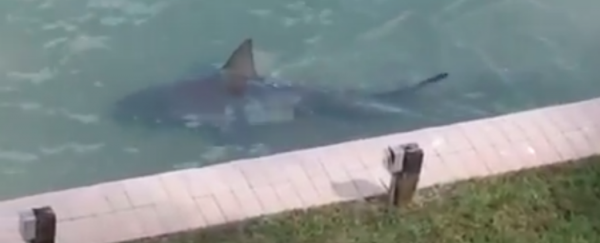Last week, residents captured this footage of a bull shark (Carcharhinus leucas), stretching almost 3 metres long, cruising alongside a waterfront residence in Bonita Springs, Florida.
While the shark's presence sure upset the locals - who are now guaranteed to never swim in that stretch of water again - it's thought that by regularly throwing food in to feed the fish, they unwittingly attracted their new guest to hunt right up on their doorstep.
"Neighbours say people are chumming - throwing bait into the water - which is causing the sharks to return," Stacey Deffenbaugh reports for NBC2 News. "Now, they are asking the city to get involved and prohibit fishing as well as designate the area as a swimming-only area."
While there's no point demonising sharks, the locals are right to be wary of this one. Not only are bull sharks known for turning up in places where people least expect them - they're often found in waist-deep waters and are one of the only species of sharks capable of surviving for extended periods in freshwater - but they can also be quiet aggressive, hence the name.
This close proximity to humans and the animal's readiness to attack - even when unprovoked - has led many experts to classify it as one of the most dangerous species of sharks in the world. "The Bull Shark is one of the few sharks that are potentially dangerous to people and is probably responsible for most of the shark attacks in and around Sydney Harbour," the Australian Museum website states.
According to the International Shark Attack File (ISAF), bull sharks are recoded to have been involved in at least 69 unprovoked attacks on humans around the world, 17 of which resulted in death. But they're likely not deliberately hunting humans. The shallow waters they hunt in are often murky because of all the upset sand and debris, which means visibility levels are low. When a bull shark sees a person moving around in the water nearby, it will assume it's a thrashing fish meal, and proceed to attack.
The locals in Bonita Springs are awaiting advice from the local authorities to see if something will be done to remove their new guest. Fingers crossed if action is taken, the opportunistic shark will just be relocated rather than culled unnecessarily.
Source: NBC2 News
